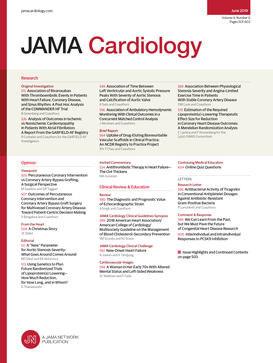Culturally Adapted Lifestyle Intervention for South Asian Adults With Cardiovascular Risk Factors
IF 14.8
1区 医学
Q1 CARDIAC & CARDIOVASCULAR SYSTEMS
引用次数: 0
Abstract
ImportanceSouth Asian adults in the US experience excess cardiovascular disease (CVD) compared with other racial and ethnic groups. The effectiveness and reach of guideline-recommended lifestyle interventions have not been evaluated in this population.ObjectiveTo evaluate whether a culturally adapted, group lifestyle intervention will improve CVD risk factors more effectively than written health education materials among US South Asian adults.Design, Setting, and ParticipantsThis single-blind randomized clinical trial was conducted from March 6, 2018, to February 11, 2023 at community sites in the Chicago, Illinois, metropolitan area. South Asian adults aged 18 to 65 years who were overweight or obese, had no history of CVD events, and had at least 1 additional CVD risk factor (hypertension, dyslipidemia, prediabetes, or diabetes) were eligible for inclusion.InterventionA 16-week, culturally adapted, group-based lifestyle intervention led by community health coaches. Lifestyle modification counseling was delivered in English, Gujarati, Hindi, and Urdu. Participants tracked their diet and physical activity (PA) and received 4 optional group maintenance sessions between months 5 and 11 of follow-up. The intervention was delivered in person prior to the onset of the COVID-19 pandemic and via videoconference starting in March 2020. The control group received written health education materials, delivered monthly.Main Outcomes and MeasuresPrimary outcomes were the between-group differences in CVD risk factor changes from baseline to 12 months, including weight, systolic blood pressure (SBP), diastolic blood pressure (DBP), glycated hemoglobin (HbA针对有心血管风险因素的南亚成人的文化适应性生活方式干预
重要性与其他种族和族裔群体相比,美国的南亚成年人患心血管疾病(CVD)的比例过高。在这一人群中,指南推荐的生活方式干预措施的有效性和覆盖范围尚未得到评估。目标评估在美国南亚成年人中,经文化调整的集体生活方式干预措施是否比书面健康教育材料更有效地改善心血管疾病风险因素。设计、设置和参与者这项单盲随机临床试验于 2018 年 3 月 6 日至 2023 年 2 月 11 日在伊利诺斯州芝加哥大都会地区的社区站点进行。年龄在 18 岁至 65 岁之间、超重或肥胖、无心血管疾病病史、至少有一个额外的心血管疾病风险因素(高血压、血脂异常、糖尿病前期或糖尿病)的南亚成年人均符合纳入条件。干预由社区健康指导员领导,进行为期 16 周、适应当地文化的、基于小组的生活方式干预。生活方式调整咨询以英语、古吉拉特语、印地语和乌尔都语进行。参与者对自己的饮食和体力活动(PA)进行跟踪,并在随访的第 5 个月和第 11 个月之间接受 4 次可选的小组维持课程。干预措施在 COVID-19 大流行开始前亲自进行,并从 2020 年 3 月开始通过视频会议进行。主要结果和测量指标主要结果是心血管疾病风险因素(包括体重、收缩压 (SBP)、舒张压 (DBP)、糖化血红蛋白 (HbA1c) 和总胆固醇)从基线到 12 个月变化的组间差异,采用多变量混合效应回归模型进行估计。次要结果为自我报告的饮食质量、活动量和自我效能,采用单变量混合效应回归模型进行估算。 结果在 549 名随机参与者中,318 人(57.9%)为女性,平均(标清)年龄为 49.2(9.5)岁。计算了干预组与对照组从基线到 12 个月的心血管疾病风险因素变化的平均差异,体重(平均差异为-0.07 千克;95% CI,-0.55 至 0.42)、SBP(平均差异为 0.47 mm Hg;95% CI,-1.85 至 2.79)、DBP(平均差异,0.44 mm Hg;95% CI,-1.06 至 1.95)、胆固醇(平均差异,-2.47 mg/dL;95% CI,-8.51 至 3.57)和 HbA1c(平均差异,-0.07%;95% CI,-0.20% 至 0.07%)。在 SAHELI 随机临床试验中,在减少美国南亚成年人心血管疾病风险因素方面,经文化调整的集体生活方式干预并不比书面健康教育材料更有效,但干预与自我报告健康行为的小幅改善有关。针对这一高风险人群的有效心血管疾病预防干预措施需要进一步研究:NCT03336255
本文章由计算机程序翻译,如有差异,请以英文原文为准。
求助全文
约1分钟内获得全文
求助全文
来源期刊

JAMA cardiology
Medicine-Cardiology and Cardiovascular Medicine
CiteScore
45.80
自引率
1.70%
发文量
264
期刊介绍:
JAMA Cardiology, an international peer-reviewed journal, serves as the premier publication for clinical investigators, clinicians, and trainees in cardiovascular medicine worldwide. As a member of the JAMA Network, it aligns with a consortium of peer-reviewed general medical and specialty publications.
Published online weekly, every Wednesday, and in 12 print/online issues annually, JAMA Cardiology attracts over 4.3 million annual article views and downloads. Research articles become freely accessible online 12 months post-publication without any author fees. Moreover, the online version is readily accessible to institutions in developing countries through the World Health Organization's HINARI program.
Positioned at the intersection of clinical investigation, actionable clinical science, and clinical practice, JAMA Cardiology prioritizes traditional and evolving cardiovascular medicine, alongside evidence-based health policy. It places particular emphasis on health equity, especially when grounded in original science, as a top editorial priority.
文献相关原料
| 公司名称 | 产品信息 | 采购帮参考价格 |
|---|
 求助内容:
求助内容: 应助结果提醒方式:
应助结果提醒方式:


